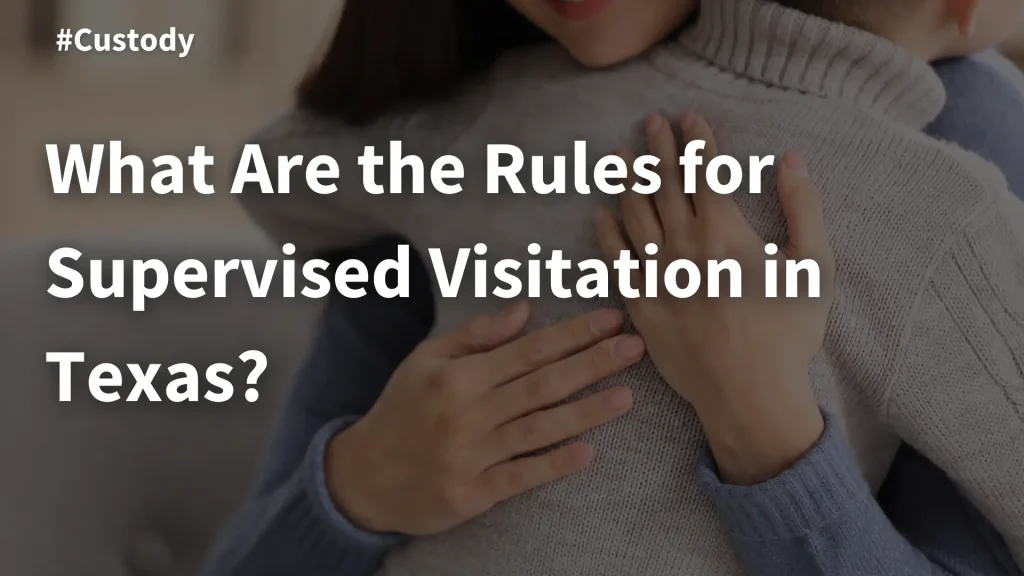 In Texas, supervised visitation is sometimes necessary to ensure the safety and well-being of children. If you’re wondering what the rules for supervised visitation in Texas are, it’s important to understand that these arrangements protect children while allowing non-custodial parents to maintain relationships with their kids. At Smith & Bledsoe Family Law, our Texas child custody lawyers can help. We guide families through these situations, ensuring the child’s best interests are always at the forefront.
In Texas, supervised visitation is sometimes necessary to ensure the safety and well-being of children. If you’re wondering what the rules for supervised visitation in Texas are, it’s important to understand that these arrangements protect children while allowing non-custodial parents to maintain relationships with their kids. At Smith & Bledsoe Family Law, our Texas child custody lawyers can help. We guide families through these situations, ensuring the child’s best interests are always at the forefront.
Understanding Supervised Visitation in Texas
Supervised visitation is a court-ordered arrangement that allows a non-custodial parent to visit their child only under the supervision of a designated person. The court orders this type of visitation when it believes that unsupervised contact with the non-custodial parent may risk the child’s safety or well-being. The primary goal of supervised visitation is to maintain the parent-child relationship while ensuring the child’s protection.
When Do Courts Order Supervised Visitation?
In Texas, supervised visitation is typically ordered under circumstances where the court has concerns about the child’s safety, such as:
- History of Domestic Violence: If there is evidence of physical or emotional abuse by the non-custodial parent, the court may require supervision during visits to protect the child from potential harm.
- Substance Abuse Issues: A court may order supervised visitation for a parent struggling with drug or alcohol addiction until they can demonstrate sobriety and stability.
- Mental Health Concerns: If the non-custodial parent has a history of mental health issues that could endanger the child, supervised visitation may be necessary.
- Abduction Risk: In cases where there is a fear that the non-custodial parent may attempt to abduct the child, supervised visitation can serve as a preventive measure.
- Neglect: If there is a history of neglect, the court may deem supervised visits necessary to meet the child’s needs.
The Role of the Supervisor
During supervised visitation, the supervisor’s role is to observe interactions between the parent and child and ensure the child’s safety. Depending on the court’s decision, the supervisor may be a neutral third party, such as a professional visitation monitor or a trusted family member or friend. The court may set specific guidelines that the supervisor must follow, including:
- Location of Visits: Supervised visits may occur at a designated visitation center, the custodial parent’s home, or another approved location.
- Duration of Visits: The court typically determines how long supervised visits last, ranging from a few hours to an entire day, depending on the circumstances.
- Reporting Requirements: In some cases, the supervisor may be required to submit reports to the court detailing the interactions observed during visits. This information can become evidence in future court proceedings to assess the appropriateness of continuing or modifying the visitation arrangement.
How Long Does Supervised Visitation Last?
One of the most common questions we hear is, “How long does supervised visitation last?” The duration of supervised visitation in Texas varies based on the specific circumstances of each case. The court may order supervised visitation on a temporary basis while the non-custodial parent works to address the issues that led to the order. For example, if the parent successfully completes a rehabilitation program or demonstrates improved mental health, the court may gradually transition to unsupervised visits.
In certain instances, the court may require supervised visitation indefinitely, especially if the underlying concerns persist or if serious apprehensions about the child’s safety continue. The goal is always to protect the child’s best interests, which may include gradually reducing the level of supervision as the parent demonstrates the ability to safely care for their child.
What Happens If Supervised Visitation Is Violated
Violations of supervised visitation orders can have serious consequences. If a parent violates the terms set by the court, such as attempting to visit the child outside of the approved times or locations, the court may take action. Common repercussions for violating supervised visitation orders include:
- Modification of Visitation Rights: The court may further restrict visitation rights or suspend visitation altogether if the non-custodial parent fails to adhere to the terms of the supervision order.
- Contempt of Court: Violating a court order can result in a contempt of court charge, including fines, community service, or even jail time in severe cases.
- Impact on Custody: Repeated violations of supervised visitation orders may negatively impact the non-custodial parent’s chances of obtaining custody or more extensive visitation rights in the future.
It is crucial for parents to strictly adhere to the guidelines set by the court to avoid these potential consequences. If you believe that the terms of your supervised visitation order are unfair or need modification, it is essential to work with an experienced family law attorney to address these concerns in court.
Modifying a Supervised Visitation Order
Supervised visitation orders are not necessarily permanent. If circumstances change, either parent can request a modification of the visitation arrangement. For instance, if the non-custodial parent has made significant improvements in the areas that initially caused concern, such as completing a substance abuse treatment program, they may petition the court to modify the order and allow unsupervised visits.
Similarly, if the custodial parent believes the supervised visitation arrangement is no longer in the child’s best interests, they can request a modification. The court will consider various factors, including the child’s well-being, the parent’s progress, and any new evidence presented, to determine whether a modification is appropriate.
How Smith & Bledsoe Family Law Can Help
With so many complexities, supervised visitation requires knowledgeable legal guidance. Smith & Bledsoe Family Law is committed to helping you understand your rights and the legal processes of supervised visitation cases. Our team will work diligently to advocate for your best interests and ensure that the court’s decisions align with your family’s needs.
Whether you need assistance obtaining a supervised visitation order, modifying an existing one, or addressing violations, our experienced attorneys are here to help. Call our law firm through (512) 277-3166 or contact us online for a free case evaluation today. Check out our success stories to know why you should trust us with your case.
Related Posts:
Can You Appeal a Divorce in Texas?
